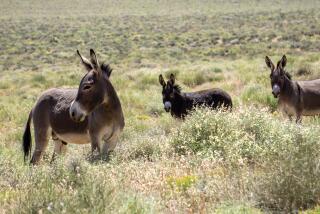Once Wild, Now Trained: Inmates Pair Well With Horses
- Share via
CANON CITY, Colo. — Randy DeVaney is a state prisoner, the result of “spending most of my life in pursuit of financial gain, so to speak.”
DeVaney, 42, an inmate at the Four Mile Correctional Center southwest of Colorado Springs, has found a new focus now, thanks to a prison program that teaches inmates to work with wild horses.
When he is released, DeVaney is hoping to put his training to good use by running a horse program for underprivileged children. “Now I know what I want to do with the rest of my life. It’s an expensive hobby, and many city kids would otherwise never get to see a horse.”
The wild horses are rounded up on federal lands in Nevada, Wyoming and Colorado and brought to the state prison under an agreement between the Colorado Department of Corrections and the U.S. Bureau of Land Management.
The program was started because BLM officials needed to do something to make the wild animals, which can be dangerous until they adapt to captivity, more adoptable and appealing.
“We formed a partnership with the prison in which they could give inmates the opportunity to learn new skills and a meaningful job and also serve a need we had in terms of marketing,” said Sheri Bell, a BLM spokeswoman. “It was really a success from the very instant it started.”
More than 2,000 horses, about 200 a year, have been trained at the 8,500-acre prison ranch since the program began in 1986.
The inmates, some of whom have never seen a horse before, must apply to be accepted to the program.
“These guys love horses or they wouldn’t be [in the program],” said corrections supervisor Brian Hardin, who co-manages the program.
All of the inmates are minimum security or minimum restricted, meaning they aren’t considered dangerous, said George Uhland, the prison’s agribusiness production manager.
In a canyon at the base of the Rockies, the inmates come to work at the ranch wearing cowboy hats, boots and chaps. It may look Wild West, but think “The Horse Whisperer” when it comes to training.
With an inmate’s supervision, one mare learning to wear a halter stands quietly tied to a fence. In a white-board pen, inmate Jaime Chapa works to get a 6-year-old black mustang to accept a saddle.
Then there are those like DeVaney’s current charge, named Hollywood. He learned to walk, trot and canter around a ring with DeVaney on his back in about two months of training.
DeVaney, like many of the inmates, has fallen in love with the horses. He spends his evenings reading books and watching videos on horse training.
Hardin acknowledges that some people may think working with horses under the crisp Colorado sky might seem more like a vacation than punishment. But he said the program teaches inmates communication skills and responsibility, and gives them goals and skills they will need when they are released.
“It’s hard to get your point across to someone who may not have a clue what you’re talking about,” Hardin said. “It also takes patience to train a horse, and to train others how to train a horse. Now maybe they’ll be able to use that patience when they go home to their families.”
The wild horses are rounded up and adopted out because they reproduce at a rate of 20% a year and would quickly starve in the wild, the BLM’s Bell said.
Prospective owners attend adoption days at the prison, where they can adopt for a fee of $125. The horses also can be adopted on the Internet and at BLM auctions.
For an extra $525 to $675 for three months, peanuts by most professional horse trainers’ standards, owners can have their new pets walking on a lead and ready to ride, thanks to the inmates.
More to Read
Sign up for Essential California
The most important California stories and recommendations in your inbox every morning.
You may occasionally receive promotional content from the Los Angeles Times.













